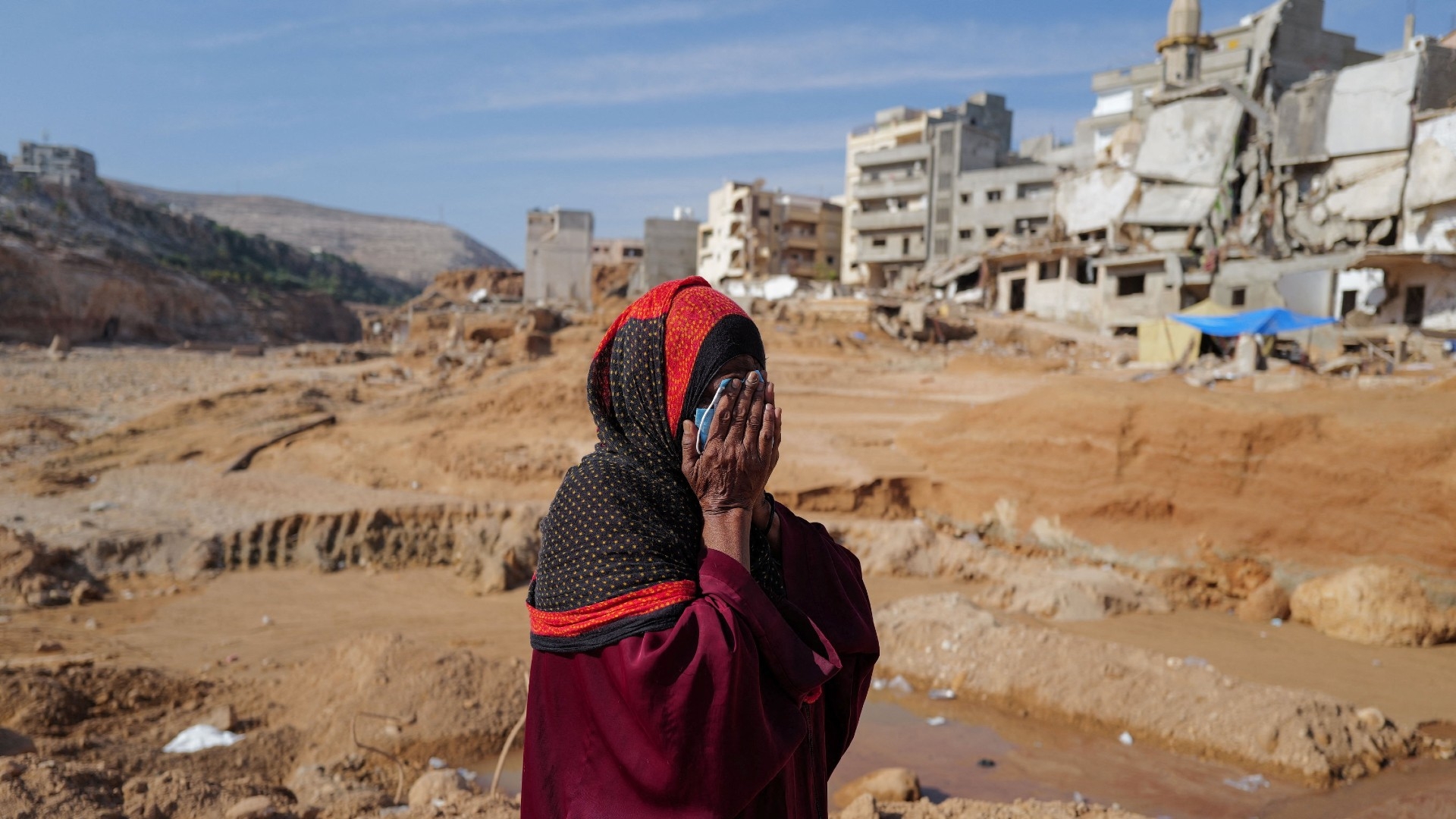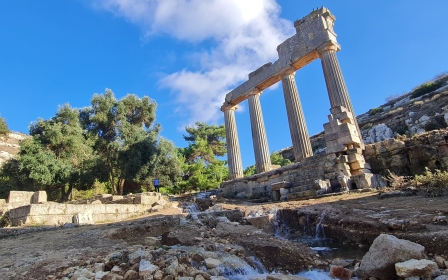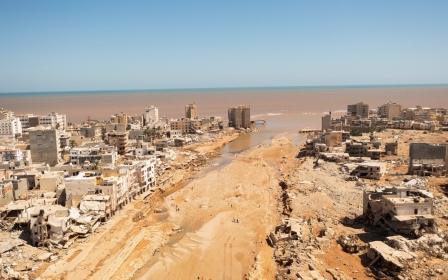Libya floods: Derna’s disaster has been followed by a plague of trauma

A week after flooding wiped a quarter of Libya’s Derna off the map, children who survived the disaster repeat the same word again and again: water, water, water.
The repetition is a known symptom of post-traumatic stress in children, an affliction that Derna’s surviving residents are increasingly grappling with.
In Derna’s gutted streets, people with glazed looks pass by rescue workers recovering dead bodies.
Around 20,000 people are believed to have been killed when Storm Daniel battered eastern Libya, overwhelming an aged dam and causing flash flooding on a catastrophic scale.
In recent days the aid response has concentrated on collecting the dead, fearing the spread of disease. But for the tens of thousands of Derna residents who survived the flood, a mental health epidemic is also a pressing concern.
Stay informed with MEE's newsletters
Sign up to get the latest alerts, insights and analysis, starting with Turkey Unpacked
“I have encountered many survivors exhibiting post-traumatic stress symptoms, causing them to feel like they are trapped in a never-ending nightmare, constantly awaiting someone to wake them up from it,” Aida al-Nafati, a mental health specialist from Tunisia supporting people in Derna, tells Middle East Eye.
“It's almost a form of denial of the disaster, and fear often lingers after the trauma.”
Some survivors have not slept since the floods. Those who have say they have been haunted by nightmares. Returning home has been triggering for displaced Libyans. Survivor’s guilt is commonplace.
There has been some solace found by people who have recovered and identified their relatives’ bodies. At least they were able to give them a proper burial. But with some 10,000 still missing, the mystery of those people’s fate has Derna residents left behind grappling with anxiety.
Like many Libyans, Ali Abdelhamid lived in close proximity to his extended family: 13 siblings and their families sharing two adjacent buildings. For families like his, that meant that when disaster struck, everyone was at risk.
“Unfortunately, my mother and my brother lived on the first floor, and we were unable to save them from the rising water. I am deeply saddened by their loss, but I thank God that we were able to give them a proper burial. Until this moment, others have not been able to locate the bodies of their loved ones,” Abdelhamid, who is in his mid-50s, tells MEE.
“Everything can be replaced except our precious mother. I have lost my beloved mother.”
Nafati says she tries to assure everyone that there was nothing they could have done to save the people they love, wanting to shed the burden of guilt.
“Everyone is profoundly affected by the horrors they witnessed or the loss of loved ones, yet they also strive to demonstrate resilience and composure in the face of this tragedy,” she says.
Psychological first aid
Children, meanwhile, process the disaster through reenactment. “Water” isn’t the only word they repeat. “Flood”, “cars”, “let's run away” are other things that repeatedly tumble out of their mouths.
Sometimes they play games imagining the flood is back. “There, I died,” you can hear them say, meticulously recounting their experiences.
Nafati and her team are focused on delivering psychological first aid to survivors. They encourage children to express their emotions, fears and sadness while providing rational explanations for what happened. Through that, they hope, positive thoughts associated with the event can be fostered to replace negative ones.
But Nafati’s team is small, and there are few specialists like her on the ground in Derna. Meanwhile, the scale of the disaster is overwhelming.
Families have lost multiple generations at once, sometimes leaving just one survivor. Often people were witnesses to their own family’s death.
“I witnessed three types of death,” recalls Mohsen. “There was a child who was strangled with a clothesline because of the force of the flood, and there was a woman who died because she collided with a palm tree,” he adds.
“The most horrifying scene I saw was how families were screaming from the top of a building, being carried away by the waters of the Lord as if they were a ship, only to disappear into the sea moments later. Every moment we heard the sounds of screaming and crying, and in moments, these sounds disappeared.”
Whole communities have been wiped out, along with the support networks they provided.
Mohammed is mourning his entire neighbourhood. “I lost most of my neighbours, and as we say, ‘neighbour before home’. In Libya, before buying any house we ask about the neighbours. I don’t know what the street would be like without my neighbours,” he says.
Nafati is also providing psychological support to the emergency crews and rescue workers who arrived on the scene and were confronted with unspeakable horrors.
Yet it’s not always easy to encourage people to open up. Alongside the trauma are feelings of pride and privacy, walls that are difficult to break down.
“We held public sessions and private sessions with survivors, because many people are afraid to express their feelings in the presence of people, even if they are family,” Nafati says.
This article is available in French on Middle East Eye French edition.
Middle East Eye delivers independent and unrivalled coverage and analysis of the Middle East, North Africa and beyond. To learn more about republishing this content and the associated fees, please fill out this form. More about MEE can be found here.






